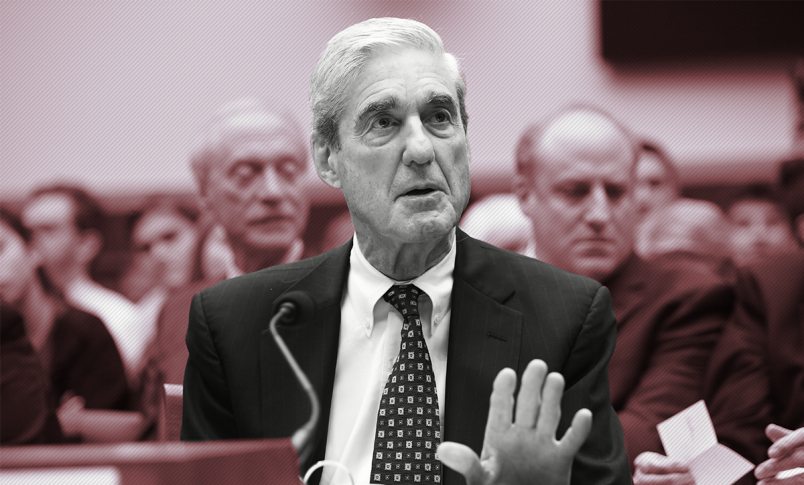If Democrats hoped that hearings with special counsel Robert Mueller would help clarify the most ambiguous aspects of his report, his testimony on Wednesday only further muddied the waters.
Mueller seemed to put his desire to stick to the script of his report above all else, meaning that any slight — and even accidental — deviations from the script roiled observers and prompted even more confusion.
Time after time, Mueller politely refused to answer key questions about his investigation. When he did, they were answers that were rooted — word for word — in what was already in the report. Democrats were forced to mostly recite lines from the report and ask him to confirm what his investigation had already revealed. And when they did get him to color outside of the lines, even by just a word, what they ultimately got were answers even more opaque than what he laid out in writing.
Dems asked that he put in layman terms his report’s line about not exonerating the President; that request got them a response that used the words “exculpated” and “acts allegedly committed.”
Perhaps, the best example of Wednesday’s frustrating dynamic was when Democrats — for about two hours — believed they had gotten Mueller to make news and answer a central question that has dogged his report: Would he have charged President Trump with obstruction were it not for the Justice Department policy barring indictments of sitting presidents?
A response from Mueller to Rep. Ted Lieu (D-CA) seemed to indicate that he would: He said “correct” when Lieu asked, “I’d like to ask you the reason, again, that you did not indict Donald Trump is because of OLC opinion stating that you cannot indict a sitting president, correct?”
But later in the day, Mueller walked back that answer, by pointing to the same convoluted language that prompted this essential mystery about his probe in the first place.
“That is not the correct way to say it,” Mueller said, referring to the question Lieu had laid out. “As we say in the report, and as I said at the opening, we did not reach a determination as to whether the president committed a crime.”
That was not the only time Mueller appeared to stumble into making news in a way that led to bewilderment whether news was what he meant to make.
He took one Republican lawmaker by surprise when he seemed to say that Trump could be indicted after he left the White House; the exchange could be interpreted, however, to mean that Mueller was speaking hypothetically about the DOJ’s no-indictment policy not applying to presidents once they leave the office.
And left hanging towards the end of the hearing was Mueller seeming to say Trump lied on his written answers to investigators. In the same line of questioning he would not say whether he found Trump credible. Muller had been asked whether Trump’s written answers were not only incomplete but also shown to be untruthful. Mueller said that was “generally” true.
In what Mueller had hoped to be his only public remarks about his report, a statement he made to the press while announcing his resignation earlier this year, the former FBI director had made clear he did not want to testify in front of Congress.
And on Wednesday he lived up to that warning he gave lawmakers.
He went out of his way not to make news and — perhaps wise to the ways of Washington — deployed tactics that would make it almost impossible to cut political ads out of his testimony.
His aides reportedly warned the committee he wouldn’t read portions of his report if asked, and sure enough, on Wednesday, he forced lawmakers to read him whatever section they were asking about, rather than provide them the soundbite.
If lawmakers tried to summarize his report in ways more accessible to the American public the best they could hope for from Mueller was a confirmation that their characterizations were “generally” true. Just as often, he told lawmakers he wouldn’t “agree” with their characterizations while refusing to explain why their assertions were wrong.
And then there was the whole host of “I can’t get into that,” “I am going to pass,” and “I can’t discuss.” Mueller’s non-answers gave birth to the very sort of speculation that he said he did not want to engage in.
For example: Did his refusal to answer a question about the national security risks of Mike Flynn’s false statements about Russian contacts really confirm that the FBI is still probing blackmail Russia could have on Trump’s inner circle? Unclear.
Conservative commentators jumped on a seeming discrepancy when he denied leaking a letter he wrote Attorney General William Barr but was seemingly more circumspect in a non-answer to a question about whether plans of Roger Stone’s arrest were leaked to CNN.
CNN has already clearly laid out that its hunch about Stone’s arrest did not come from a tip from prosecutors, making his refusal to answer that question, while denying other leaks, even more puzzling.
The only place Mueller seemed deliberative and eager to break out of the stick-to-the-report mold was to defend his team. Unfortunately for the prosecutor those answers — the only ones where he seemed ready to give an extended response — were cut off by the Republicans who questioned his team’s integrity.







one would like to think that loyalty to country would supersede loyalty to process/reputation…
silly me.
Really? That’s what you took away from this today?? Honestly???
Pfffffff-ffffff0ffffff-ffffff.
Oops, all the air is out of the balloon. Gee, who woulda tunk it?
He was trying to adhere to the constraints that Barr but on him.
No, I think that was you. Excuse yourself.